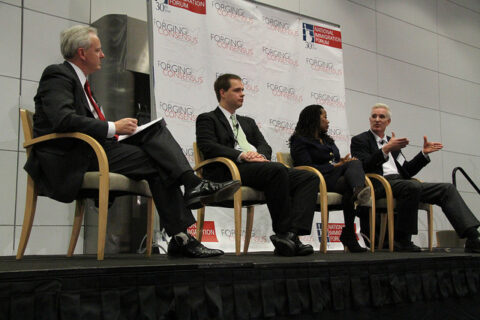Immigration Reform

Business and Religious Leaders Come Together to Champion Immigration Reform
Immigration reform is an undertaking of such importance that it should transcend partisanship. That was the fundamental message of the business and religious leaders who gathered together yesterday at a press conference organized by the National Immigration Forum. The press conference was part of a campaign called Forging a New Consensus on Immigrants and America, which describes itself as “a growing and diverse constituency of conservative, moderate and progressive leaders that is determined to go beyond the rhetoric and find common ground for practical solutions.” The event comes on the heels of an announcement late last week by Thomas Donohue, President of the U.S. Chamber of Commerce, that a broad coalition of business, labor, religious, law enforcement, and ethnic organizations has coalesced around the cause of immigration reform. Read More

Out of Legal Options, Alabama Files Petition at Supreme Court
Nearly five months ago, a federal appeals court in Atlanta issued a set of opinions that invalidated numerous provisions of Alabama HB 56, the most pernicious state immigration law in the country. After Alabama asked the full court to reconsider its rulings, the active judges unanimously rejected its request. Out of other legal options, the state filed a petition with the Supreme Court on Wednesday seeking to revive some (though not all) of the invalidated provisions. While the odds remain small that the Justices will take up the case, granting the petition could set up another legal showdown similar to the case over Arizona SB 1070. Read More

Immigrants Add Billions to the Arkansas Economy
A perennial question in the immigration debate is whether or not immigrants contribute more to the economy than they cost. That is, do they add more economically as workers, taxpayers, consumers, and entrepreneurs than they “consume” in public education, public healthcare, and public benefits? In some ways, this question is misleading. Education and healthcare are social investments that pay future dividends; they are not merely fiscal expenses. Nevertheless, it is a useful exercise to take the question at face value and do the math. The result, contrary to the convoluted arithmetic of anti-immigrant activists, is overwhelmingly positive. Immigrants add far more to the economy than they take away. And given the aging of the native-born population, the contributions of immigrants (and their children) will only increase over time. Read More

Why Immigration Reform and Gun Control Aren’t in Competition
Ever since the horrible tragedy in Newtown, Connecticut, political odds makers have been betting that gun safety will top the President’s list of priorities this year, despite previous statements prioritizing immigration reform. That’s an unfortunate characterization, pitting two important issues against one another and adding to the mistaken idea that immigration reform is such a momentous undertaking that nothing else can happen at the same time. Read More

Illinois Legislature Votes to License all Drivers in the State
On Tuesday, the Illinois legislature passed a bill to allow state residents without legal status to obtain a three-year renewable driver’s license. The law will create tens if not hundreds of thousands of newly licensed drivers. The bill, which awaits the Governor’s promised signature, will make Illinois the third state after New Mexico and Washington to allow unauthorized immigrants to obtain driver’s licenses. (Utah allows undocumented immigrants to apply for driving privilege cards.) Read More

Reasons for Cautious Optimism on Immigration Reform
There is considerable debate at the moment over the prospects for immigration reform this year. On the one hand, an electorally chastened Republican Party seems to be reevaluating its long-standing support for deportation-only immigration policies. On the other hand, it looks as though the White House and Congress are embarking upon lengthy debates over gun control and tax-and-spending policies; debates which might leave little room for a rational discussion of U.S. immigration laws. Nevertheless, reports from the White House indicate that President Obama is ready to forge ahead on immigration reform. It remains to be seen, however, what form that will take. Will the President opt for a truly comprehensive solution, or will he adopt a more piecemeal type of reform that targets only some subsets of the immigrant population? Let us hope that the comprehensive approach prevails. The fates of millions of people have been hanging in the balance for far too long. Read More

DHS Publishes New Provisional Waiver to Help Some Families Stay Together
Some families facing long separations from their loved ones because of U.S. immigration laws will have an easier time of it in 2013. Thanks to a new regulation from the Department of Homeland Security (DHS), immediate relatives of U.S. citizens will be able to complete part of the processing of their immigration cases without leaving the country. The “Provisional Unlawful Presence Waiver of Inadmissibility for Certain Immediate Relatives” rule, often referred to as the new family unity rule, will be published tomorrow (January 3, 2013) and become effective on March 4. Read More

Countdown of the Top Five Immigration Stories of 2012
In the beginning of 2012, the landscape of the immigration world looked much different. Pro-immigrant groups were coming off of a rough few years that saw the failure of the DREAM Act, a spike in deportations under President Obama, and the passage of several state-level restrictionist bills like Arizona’s infamous SB 1070 and Alabama’s HB 56. However, immediately after the 2012 Presidential election, the discussion around immigration reform was reignited and led with legalization for the 11 million undocumented immigrants currently living in the country. What changed? Here’s our take on five of the biggest reasons 2012 has been a catalyst for change: Read More

America’s Aging Crisis Will Only Grow Worse With Declining Immigration
As a recent story in The Economist notes, the conventional wisdom has long been that “because Americans have so many babies and welcome so many immigrants, they had more room to deal with the coming burden of pensions and health care for the elderly.” But that is no longer the case. The story goes on to point out that “the savage recession of 2007-09 and its aftermath…have weakened those demographic advantages. America’s fertility rate has been falling since 2007, as has net immigration.” In other words, there are going to be fewer working-age, tax-paying adults to support the rapidly growing number of elderly Americans. Read More

Colorado Digs Itself Into a Fiscal Hole in the Name of Immigration Enforcement
At a time when state budget deficits are growing larger, you might think that state governments would avoid imposing costly, unfunded mandates on themselves. Yet that is exactly what states are doing when they pass laws that transform their police officers into proxy immigration agents. As officers spend more of their scarce resources and time rounding up people whom they suspect of being unauthorized immigrants, costs mount not only for the police force, but for jails and courts as well. More often than not, these costs are being needlessly incurred in order to lock up people who are in no way a threat to public safety. Read More
Make a contribution
Make a direct impact on the lives of immigrants.
